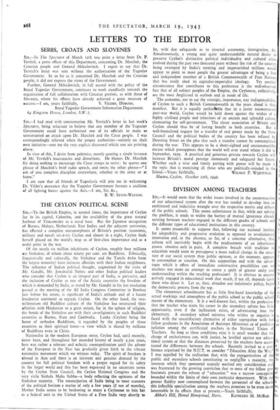DIVISION AMONG TEACHERS
SIR,—It would seem that the wider issues involved in the reconstruction of our educational system after the war has tended to develop into an embittered and indecisive wrangle over the respective merits and defects of the public schools. This seems unfortunate in that, while not solving the problem, it tends to widen the barrier of mutual ignorance already existing between teachers engaged in the different grades of schools and the different types of educational institutions in this country.
It seems reasonable to suppose that, following our national instinct for adaptability and progressive evolution as opposed to revolutionary innovation and, in the absence, so far, of a concrete alternative, that reform will inevitably begin with the readjustment of an inheritance grown obsolete only in parts. A complete breach with tradition in education would seem to presuppose a more radical change in the struc- ture of our social system than public opinion, at the moment, appears to contemplate or sanction. On this supposition and with the advan- tages which it offers of immediate constructive possibilities can we teachers not make an attempt to create a spirit of greater unity and understanding within the teaching profession? It is obvious to anyone actively engaged in educational work that much, if not all, depends upon those who direct it. Let us, then, abandon our isolationist policy, begin the democratic process from the top.
The elementary schoolmaster has as little first-hand knowledge of the actual workings and atmosphere of the public school as the public school master of the elementary. It is a well-known fact, within the profession, that the teacher who starts his career in the secondary sphere has little opportunity, even if the inclination exists, of adventuring into the elementary. A secondary school mistress who wishes to organise is faced with the unsatisfactory alternative of either segregation with her fellow graduates in the Association of Assistant Mistresses or of profitless isolation among the certificated teachers in the National Union of Teachers. So long as these conditions exist it is small wonder that the charge of exclusiveness can, with justice, be levelled against our educa- tional system or that the distances preserved by the teachers have accen- tuated the differences between the schools. Recently invited to a con- ference organised by the N.U.T. to consider " Education After the War," I was appalled by the realisation that, with the representatives of the public and secondary schools constituting so negligible a majority, the interests which they sponsored scarcely merited any consideration and was frustrated by the growing conviction that to most of my fellow pro- fessionals present the reform of "education" was a narrow conception bounded within the limits of their own particular department. With the greater fluidity now contemplated between the personnel of the schools this inflexible specialisation among the teachers promises to be even more lamentable in its effects than at present.—Yours faithfully, Abbot's Hill, Hemel Hempstead, Herts. KATHLEEN M. MCRAE.


























 Previous page
Previous page